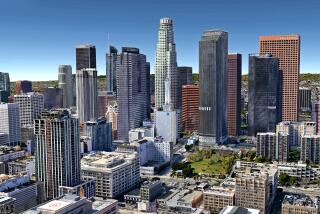City Would Market Property for Development : GM Offers to Sell Plant to South Gate
- Share via
SOUTH GATE — General Motors Corp. has decided to give city officials first crack at buying the 89-acre GM plant on Tweedy Boulevard that has been idle for three years.
The city has until Dec. 31 to buy the 49-year-old plant for what city officials said is a bargain price of $15 million. The plant has been listed for sale by GM at $32 million, city officials said.
A contract has been quietly negotiated by GM and South Gate officials in the past 10 days. It was unanimously approved Monday by the City Council. A GM spokesman said the company had signed it earlier this month.
The catch is that South Gate, a city with a $14.6-million general fund and declining revenues, can only afford the bargain price if it can find a commercial buyer willing to purchase and redevelop the property by Dec. 31.
The deal provides little risk for South Gate officials, however, because it carries no penalty. If South Gate is unable to find a buyer for the plant, the city would owe GM nothing, city officials said.
Jobs, Tax Revenue
“It’s a chance to bring something into the community that’s going to generate (both) jobs that we sorely need and tax revenues,” said Councilman Hank Gonzalez.
In a statement announcing the contract, Mayor Bill De Witt said, “Although the time frame is admittedly tight, the city is hopeful that it can remarket the property quickly to re-stimulate the local economy and improve the condition of the general fund.”
Fred Craig, a spokesman at GM headquarters in Warren, Mich., said the contract calls for selling the land to the city only if there is a closing by Dec. 31.
“We wanted to do what we felt was good for the city as well as General Motors,” Craig said.
GM to Get Tax Break
Bruce Spragg, South Gate’s chief administrative officer, said that if the city can sell the property, GM would be able to write off as a tax break the difference between the land’s value and the sale price to the city--a difference of $17 million.
GM spokesman Craig confirmed the company’s interest in such a tax break, and James M. Springer of Cushman & Wakefield of California Inc., the Los Angeles broker for the property, confirmed the value of the land and the listing price are $32 million.
Springer said that 40 to 50 firms have already toured the property and that almost all have suggested demolishing the GM factory and redeveloping the site, which is located in the city’s redevelopment district.
Spragg said the city was “very appreciative” of the GM deal because, he said, it would give the city the chance to pick a developer that could generate sales tax revenues. Two proposals that have been discussed for the property--a state prison and a post office--would remove the property from the tax rolls, city officials said. The city in 1985-86 has budgeted $4 million in expected sales tax revenues.
GM, once the largest employer in South Gate, closed the plant during a sales slump in March, 1982, at a cost of 4,300 jobs and $350,000 in annual property taxes to the city. Since the plant closed, all but 500 of the workers have been reassigned to GM plants around the country. The plant is now used by GM to store new cars.
The city in January spent $35,000 on a consultant’s report that urged GM to reopen or sell the plant, but corporate officials decided a month later to sell it.
“We didn’t see any new products that were going to go into that site,” corporate spokesman Judith Merriott said in February. “It just wasn’t economical.”
The report suggested that the plant could be reused for high-tech electronics, robotics or to manufacture cars, buses or vans. When the plant closed, the city valued the property at $108 million, but since then, GM has removed equipment valued at $50 million.
The sale price for the land depends on how much the city would receive in future sales tax revenues, City Atty. Bruce Boogaard said, adding that the plant could be used for manufacturing, industrial or commercial uses.
“The more intensive the land use the more we’ll agree to mark it down,” Boogaard said. “We don’t want to build up the hopes of the community unnecessarily, but we think that it’s possible to get that plant reused for the value of South Gate with a lot of hard work and long hours.”






